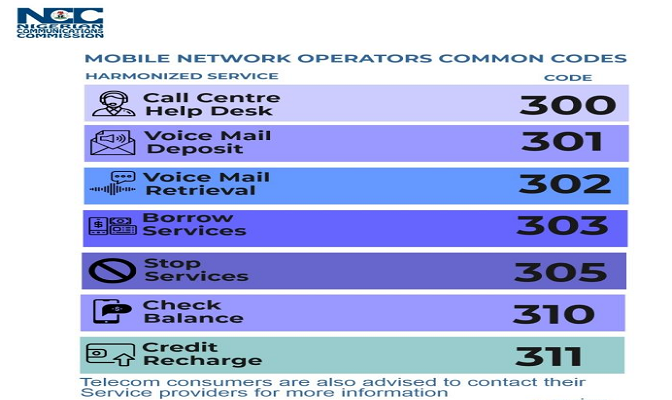Mobile network operators (MNOs) have been directed by the Nigerian Communications Commission (NCC) to start using approved harmonized short codes (HSC) to provide specific services to telecom customers in Nigeria.
Reuben Muoka, Director of Public Affairs for the NCC, recently signed a statement that contained this information. The 226 million active telecom users in the nation will be able to access services across networks with ease thanks to the new codes, the NCC added in the statement.
The NCC had given mobile operators until May 17, 2023, to completely transition from the previously disparate short codes to the harmonized codes.
Read also: Nigeria Telcos begin Implementation of Uniform Shortcodes
The objective of the harmonized short codes
The harmonized short codes are aimed at achieving uniformity in short codes across networks.
The NCC wants the code for checking airtime balance, and other services that require codes to be the same across all mobile networks for the same function, irrespective of the network a consumer uses.
According to the NCC, All networks are expected to familiarize themselves with the new codes for various services and fully migrate to the new codes by the expiration date.
13 harmonized short codes
Thirteen new harmonized short codes have been approved by the communications Commission.
The code, 300, Will to be used as the harmonised code for Call Centre/Help Desk on all mobile networks; 301 for voice Mail Deposit; 302 for Voice Mail Retrieval; 303 for Borrow Services; 305 for STOP Service; 310 for Check Balance, and 311 for Credit Recharge.
Also, the common code for Data Plan across networks will now be 312. In line with the new direction, 321 is for Share Services, while 323 is for Data Plan Balance. The code 996 is now for Verification of Subscriber Identity Module (SIM) Registration/NIN-SIM Linkage.
The code, 2442, is retained for Do-Not-Disturb (DND) unsolicited messaging complaint management, while the common code, 3232, is also retained for Porting Services, otherwise called Mobile Number Portability.
NCC Modernization programme
The statement explained that the initiative is In line with ithe NCC’s consumer-centric approach to modernize Telecommunication in the country through regulation.
“The initiative, which is in line with NCC’s regulatory modernisation programme, is essentially to make life much easier for telecom consumers, as it is now easier for Nigerians to memorize single codes for various services across all mobile networks they may be using, thereby improving consumer quality of experience (QoE).
“In addition, the new policy will provide an opportunity for licensees in the Value-Added Services (VAS) segment of the telecoms sector to be able to use freed-up/old codes for other services, as well as enhance cohesive regulatory framework in keeping with world-class practices.” The statement read.
About NCC
The Nigerian Communications Commission was founded by the Nigerian Communications Act 2003, which was signed into law on July 8, 2003, by former President Chief Olusegun Obasanjo (GCFR).
The Commission is granted the authority to carry out regulatory responsibilities and actions in order to facilitate the implementation of national communications or telecommunications policy.
It is also charged with the responsibility of creating an effective, impartial, and independent regulatory authority for the Nigerian communications industry, as well as promoting the provision of modern, universal, efficient, reliable, affordable, and easily accessible communications services throughout Nigeria.
